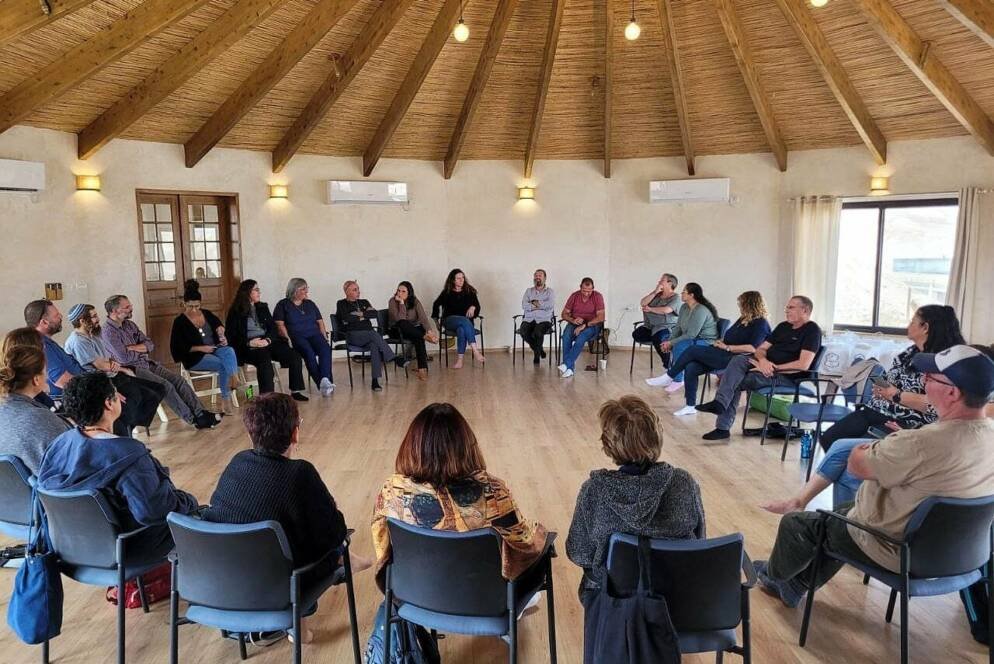
Israel is facing an unprecedented mental health crisis, as Israelis of all ages struggle to cope, still grappling with the effects of the October 7 massacre, as well as displacement, hostage takings and the ever-present threat of rocket attacks.
Mental health clinics in Israel are overwhelmed with appointments and treatment requests and are unable to keep up with the increased demand.
“There are a number of healing steps that need to be taken immediately for our brothers and sisters in Israel,” said Kelly Romirowski, chief strategy and impact officer at the Jewish Federation of Greater Philadelphia, who has a doctorate in clinical psychology specializing in organizational and leadership development, school psychology and health psychology. “This is not just a traumatic event, it’s an ongoing nightmare for the people who live there.”

According to Moshe Bar Siman Tov, director general of the Israeli Ministry of Health, around 100,000 people have suffered traumatic events as a result of the ongoing war.
The impact has been clear to Israelis, including Tali Leider, director of the Jewish Federation’s Israel and World Affairs department.
“As an employee of the Metropolitan Philadelphia Jewish Federation in Israel, I see the impact of this crisis every day,” Ridder said. “The mental health and providing a sense of security to displaced residents after the worst attack our country has seen in recent years is a top priority.”
To address this critical need, Ridder and his Israel-based team have been working with local organizations and service providers. They engage with people across the country, particularly in the Jewish Federation’s Partnership2Gether neighborhoods in Netivot and Sdot Negev in the Gaza Strip. Through these engagements, the Jewish Federation is able to assess mental health needs, vet organizations best able to address those needs, and allocate critical funding to support their work.
“For more than 25 years, we have built strong, trusting relationships and open dialogue with our partner communities,” Ridder said. “Our partners know that as the Jewish Federation, we are there for them. As we pledge to help rebuild the country after the Oct. 7 attacks, the Jewish Federation understands that strengthening the individual and collective resilience of Israelis is an essential component of this mission.”
The organization has invested more than $15.8 million from the Philadelphia Stand with Israel Emergency Fund to address priority needs post-October 7, including mental health services, in addition to funding received throughout the year from the Jewish Federation’s annual campaign.
Netivot’s Israel Trauma Response Preparedness Coalition is one of the organizations the Jewish Federation has supported for years, providing critical psychosocial services to people in the region. In 2022, ITC had 7,000 clients and employed 240 therapists across its network of 12 locations. Today, that number has grown to 21,000, with 1,300 therapists on staff.
“We could not have overcome this challenge without the support of the Jewish Federation,” said ITC founder and CEO Tally Lebanon. “It’s not just the financial help they provided us. We felt seen, recognized and cared for.”
Over the past three years, the Jewish Federation has contributed $100,000 to the ITC through the Jewish Community Fund, the organization’s main source of funding that is distributed unrestrictedly to those most in need. Since Oct. 7, the Jewish Federation has provided the ITC with an additional $60,800 in emergency funding.
“We must invest in a multifaceted approach that includes both treatment and prevention efforts in every environment where people live, work and learn,” Romirowski said. “We cannot rely on having a therapist for every member of Israeli society. To stem the tide of intergenerational transmission of trauma, we need to instill trauma-informed caring roles in the adults in every child’s life.”
Jewish Federation funding supports direct, comprehensive and innovative resources for people of all ages and backgrounds, including soldiers, underrepresented communities and young people growing up in times of crisis. According to the Israeli Pediatric Society, 84% of Israeli children have experienced psychological distress in the aftermath of the attacks. Looking at children directly affected by October 7, that statistic rises to 93%, of which 69% suffer from anxiety disorders.
To address the mental health needs of Israeli youth, the Jewish Federation has allocated funds to several child-focused organizations, including Dror Israel, which has established temporary schools and daycare centers for displaced children and their families, providing therapeutic, emotional and educational support.
“We provide psychological first aid to children affected by the realities of war: orphaned, displaced, or enduring the constant sounds of rockets and sirens,” said Dror Israel Engagement Director Joanna Zeiger Guerra. “The work we do now for these children is urgent and urgent. Thanks to the Jewish Federation’s support, we can respond to the growing mental health needs of young people. The support and tools these children receive today will be a defining factor in how they live the rest of their lives.”
Therapy session at the ITC Resilience Centre
Courtesy of the Israel Trauma Coalition

